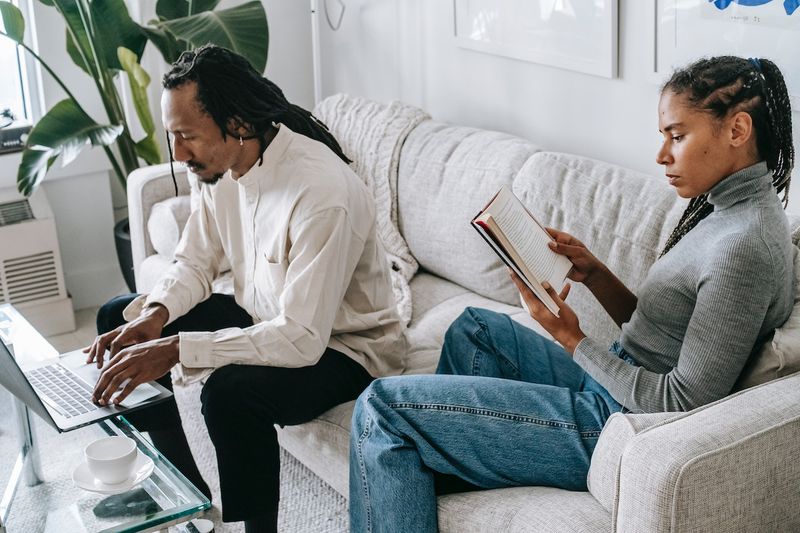17 Subtle Behavioral Patterns That Often Signal a Marriage Is Definitely Over, According to Experts
Because the loudest red flags aren’t always the most dangerous — sometimes, it’s the quiet unraveling.
Divorce rarely begins with a dramatic bang. More often than not, it’s the slow, sneaky shift in our daily habits—the untold stories, the dodged questions, the routines that feel empty—that quietly spell out the beginning of the end.
Relationship experts say the real clues your marriage is slipping away aren’t found in screaming matches, but in those little things you stop noticing. It’s the space between the words, the growing distance in a shared room, and the unspoken moments that build up over time.
Here are 17 subtle patterns therapists say can mean the emotional ending of a marriage long before anyone signs the papers. Read with an open heart—and maybe a little side-eye. Sometimes, clarity is the first step to real change.
1. When Small Talk Disappears

Funny how the words you barely noticed—like “How was work?” or “Guess what happened today?”—suddenly matter when they vanish. It’s not just the silence, it’s the loss of those tiny threads that used to hold the day together.
You realize it’s been weeks since you shared the random stories, the jokes, or even the eye rolls about your boss. The quiet isn’t peaceful—it’s loaded. When check-ins fade, so does that sense of partnership.
It’s not about grand gestures or deep conversations. Those little daily chats are the glue. When they’re gone, it’s a warning that the emotional temperature is dropping, and the connection isn’t what it once was.
2. Roommates, Not Lovers

Ever catch yourself wondering, “Are we just two people managing a household?” It’s less about arguments and more about the awkward, empty routines.
You find yourselves moving through the same space but rarely connecting. There’s no spark, no playful teasing, not even a random hug. It’s like running a business together, not sharing a life.
The absence of conflict might seem like a win, but real intimacy is missing. When you start to feel like co-tenants instead of partners, it’s often a sign something precious has quietly slipped away.
3. Emotional Indifference Takes Over

The opposite of love isn’t always hate—it’s indifference. When you stop caring about your partner’s moods, needs, or wins, something deeper is off.
Maybe you used to worry if they were upset or celebrate their small victories. Now? Shrugs all around. There’s no urge to comfort, and their happiness or pain barely registers.
This isn’t about stone-cold silence or shouting matches. It’s just an empty space where emotion used to live, and it can sneak up so quietly you don’t notice until you’re already miles apart.
4. The Future Becomes a Solo Project

There used to be shared dreams—vacations, house projects, even silly bucket-list ideas—floating around. Now, it’s all about “me” instead of “us.”
No one talks about next summer or where you’ll be in five years. You plan things alone, maybe without even noticing. That subtle switch from togetherness to independence is telling.
When the team mentality fades and you’re both just aiming for your own goals, it’s a quiet clue that the foundation of “we” is cracking, even if everything else looks fine on the outside.
5. The Chill That Follows Conflict

You know the vibe—after a disagreement, instead of hashing things out, you both just freeze each other out. There’s no storm, just a frosty silence that lingers like a bad perfume.
It’s not about fighting less; it’s about not caring enough to resolve things. Emotional energy is gone, replaced by avoidance. You start to believe it’s easier to just let things lie, even as the gap grows wider.
Experts say when conflict turns to coldness, it’s a sign you’re not invested in fixing what’s broken. That icy void is where resentment breeds and connection runs thin.
6. Alone Together Feels Awkward

Remember when long drives or quiet dinners were your mini getaways? Now, being alone together feels like walking on eggshells—or you avoid it altogether.
You fill every moment with distractions: TV, phones, errands. Anything but just the two of you, in silence. And the strangest part? You don’t even miss that old closeness.
When together-time turns uncomfortable or gets avoided altogether, it’s a sign that intimacy has been replaced by distance. The empty space between you feels more like a wall than a warm hug.
7. Physical Affection Fades Away

It starts with fewer hugs, less hand-holding, and the tiniest excuses for not cuddling on the couch. Suddenly, your body remembers the last time you touched—and can’t recall when it was.
This isn’t just about physical intimacy. It’s the quick squeezes, the forehead kisses, the casual brushes against each other in the kitchen. When those disappear, it’s more than a dry spell.
Physical affection is one of the easiest ways to say, “I see you, I care.” When those gestures go missing, it’s a subtle but powerful signal that something real is slipping away.
8. Confiding in Others, Not Each Other

There’s a certain guilt you feel when you realize your deepest thoughts go to someone else—maybe your best friend, a sibling, or even a coworker.
Emotional outsourcing creeps up. You start sharing your fears, hopes, and frustrations outside your marriage. It feels easier, safer, less complicated.
And while it’s healthy to have support beyond your partner, a pattern of confiding in others first is a big neon sign that your emotional intimacy has packed up and left. The inside jokes and real talk move outside, and your partner becomes an afterthought.
9. Feeling More Yourself Away from Them

It hits you at brunch with the girls or while chatting with coworkers—you’re lighter, more relaxed, unmistakably yourself.
Back home, you shrink a bit. You’re quieter, maybe even a little guarded. The difference is so stark, it’s almost disorienting. Your spouse feels more like an audience than a co-star in your life.
If you feel more seen, more vibrant, or simply happier away from your partner, it’s not just “me-time.” It could mean the loving, safe space between you two has faded, leaving a version of you that’s only half there.
10. Arguments Disappear—But So Does Caring

At first, less fighting seems like a blessing—but only if you’re actually resolving things. There’s a difference between peace and surrender.
When you stop arguing because you’ve stopped caring, the silence is heavy with things unsaid. No one’s fighting for the relationship anymore. The effort is gone.
This kind of quiet isn’t golden; it’s lonely. If avoidance has replaced conflict, it could mean you’ve both quietly accepted a level of detachment that’s hard to come back from.
11. Respect Slips Away, One Eyeroll at a Time

Here’s the truth: contempt is a love killer, and it rarely roars—it sneaks in. A sarcastic comment here, an eye roll there, a subtle sigh of annoyance.
It’s easy to brush it off as stress or a bad day, but a pattern of snippy remarks or dismissive tones wears down even the strongest bond. Admiration quietly dissolves, replaced by tiny digs that add up.
When mutual respect starts to slip, the foundation of friendship and partnership gets shaky. What used to be playful banter turns sharp, and the warmth in the relationship chills over fast.
12. Preparing for a Life Apart—In Secret

You might catch yourself thinking, “Would I be okay on my own?” That turns into peeking at apartments or quietly reconnecting with old friends.
Opening a solo bank account or looking for ways to be self-sufficient isn’t just about being practical. It’s a silent preparation for a future that doesn’t include your partner. You’re building an escape plan, even if you’re not ready to admit it.
When you start gathering independence in secret, it’s a sign your heart has already started letting go—even if you’re not sharing it out loud.
13. Turning Elsewhere in Times of Stress

Remember when your partner was your go-to for comfort after a tough day? Now, you turn inward or reach for anyone else before them.
The support system shifts, and suddenly your spouse is out of the loop on your worries or victories. Maybe you handle things alone or look for support in places you never did before.
If you can’t lean on each other during hard times, it’s a sign the relationship isn’t a safe space anymore. And when you stop seeking comfort from each other, it’s hard to rebuild that trust.
14. The ‘We’ Becomes ‘Me vs. You’

You catch it in your own words: everything shifts from “we” to “I” and “you.” There’s no more team spirit, just separate agendas.
It sounds like, “I did this,” or “You never…” instead of “We should…” or “Let’s try…”. The language gives away what the heart is hiding—emotional distance, a shaky foundation.
When your vocabulary splits, so does your connection. The words you use show the gaps you feel, sometimes before you’re even ready to face them.
15. Lonelier With Them Than Without

Few things sting like sitting next to someone you once loved deeply and feeling more alone than ever. Physical closeness means nothing when the emotional gap is a mile wide.
It’s not just a bad mood or a rough patch—it’s a persistent ache. You long for connection that never comes, even though you’re right beside each other.
This is more than missing your partner; it’s missing yourself in the relationship. When loneliness feels louder with them than without, it’s time to face what’s really happening beneath the surface.
16. Silent Withdrawal from Shared Activities

Imagine a couple once inseparable, where shared hobbies and weekend adventures were the norm. Over time, those once cherished activities become a solo venture.
The joy of experiencing things together fades, leaving behind a void. It becomes easier to pursue interests alone, marking a silent withdrawal from shared life.
The absence of mutual engagement often underscores a deeper disconnect. These quiet choices speak volumes, signaling a marriage where companionship has been replaced by solitude. Such shifts may appear insignificant but can reflect significant emotional distancing.
17. Financial Secrets and Separate Lives

Financial transparency is vital, yet the emergence of hidden accounts or secret expenditures can crack the foundation of trust.
When partners begin leading financially separate lives, they may be preparing for independence.
This covert behavior indicates a shift from partnership to individualism. Monetary secrecy often masks larger issues, symbolizing a detachment not only in finances but in emotional investment as well. Hidden financial dealings can be a harbinger of a relationship unraveling, where autonomy trumps unity.







